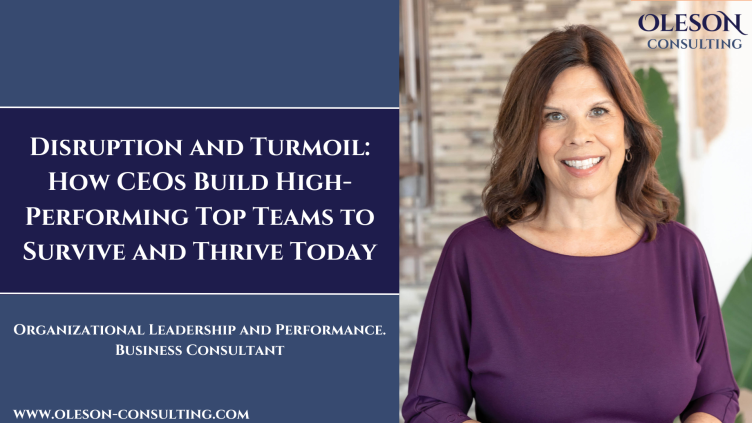
Most CEOs have weathered disruption and turmoil over the past several years (staffing, economic uncertainty, supply chain, and more). Inundated every day with hundreds of emails and too many meetings, many report difficulties solving longstanding problems or having room to plan and innovate. These feelings are common among leaders, but they may be missing the greatest advantage for leading during challenging times – the effectiveness of the top team. How members of the top team work together and organize the company into processes, operations, and behaviors determines the potential for success in achieving their goals and serving clients. Like Wickman, author of Traction, says: “As goes the leadership team, so goes the company.” In this article, I share how CEOs and senior leaders develop into a cohesive, high-performing leadership team.
Why do organizations continue to struggle with their teams?
I have dedicated the last two decades to leading and consulting with executives and wrote my doctoral dissertation on what leaders need to grow high-performing leadership teams. I wondered why leaders continued to struggle with their leadership and team performance, and I uncovered key strategies for helping CEOs develop high-performing organizations. In Fall 2022, I surveyed senior leaders and practitioners to understand if those organizational performance strategies applied in times of disruption and turmoil. My results mirrored longstanding leadership data:
Lack of Cohesion. CEOs and top team leaders are too busy and focused on their own challenges to know and trust each other. They compete for resources and lead their own teams in different directions. Solution: Teamwork. The company’s top team must be cohesive, trust and support each other, and lead their own teams in the same direction as other teams across the company.
No Clarity or Alignment. Top team members are not aligned on how to execute the company goals and do not know how decisions are being made or who is responsible for different roles and outcomes. Everyone is stressed and burned out, not seeing how anything will change in the future. Solution: Commitment. Top team members need to be clear about the purpose and goals of the organization and commit to how the work gets done within their own teams.
Ineffective Operations. There are too many unproductive meetings and not enough shared metrics for clear decisions and actions. The company continues to miss targets and is not positioned for growth and change. Leaders are solving the same problems over and over, and they are missing time and space to generate new ideas and innovate. Solution: Accountability. Top team leaders implement operations that support the priorities and provide clarity on governance and roles, cascading clarity and alignment to their own teams and developing an environment of accountability. Everyone begins rowing in the same direction, and improvements ‘stick’ in the future.
Disorganization. Leaders are not clear which company activities are helping meet the goals. Top team members do not have a shared view of what is needed or how / what to solve. Solution: Performance. The CEO and top team have systems in place to monitor performance and how the critical work is being done, who is rowing in the right direction, and how teams are behaving with each other.
I hear common limiting beliefs from CEOs
Strategies for high-performing teams are widely available in expert books, articles, and podcasts. Why do organizations continue to struggle with their teams? Why aren’t leaders investing in development of a cohesive, aligned, productive top team? I hear common limiting beliefs from CEOs:
1. It’s not possible. Leaders think that if it were possible to invest in building a high-performing team, they would already be doing it. They would have learned it’s possible through experience on a high-performing team earlier in their career. Peers would be talking about how they are doing it. But few share with others what they found for effective top team development that sticks and truly changes the company’s future. And in a typical senior leader’s day, when do they have time and space to read or hear about the tried-and-true elements of growing their own high-performing top team?
2. It’s not my job. Senior leaders believe that ‘team’ work is someone else’s responsibility within the company – outsourcing to HR or external consultants – while they tend to ‘more important’ issues. However, only the CEO and top team leaders can learn and develop the team for lasting change and success. Also, nothing could be more strategic or impactful than doing the foundational work to get the top team (and their teams) rowing in the same direction, trusting each other, making effective decisions, engaging in fierce debate and healthy conflict, and coming together on final decisions to execute with their teams. In Lencioni’s 2012 ‘The Advantage’, he cites teamwork and clarity / alignment as the greatest strategic advantages for every organization. All results are impacted by how leaders lead and their teams work together.
3. It’s too hard, I don’t have time, I’m already too busy, I couldn’t add one more thing. The reality is that it’s harder and more time-consuming to be dysfunctional and row in different directions across the organization. The good news is that there are steps for developing leaders and teams and changing the established cycles of leader interactions (weekly, monthly, quarterly, annually) to have the right conversations with the right people to make the right decisions and execute the right actions – which will begin to reduce the amount of time spent on unnecessary drama and firefighting or wasted time focusing on priorities that aren’t creating the success you desire.
4. We tried, but it didn’t help. Leaders hire consultants or host trainings to address ineffective meetings, decision-making, self-awareness, and more. But the system and culture will swallow up any gains made in one or two areas. The best approach is to address the whole system by developing a high-performing top team methodically and bringing other teams along in an organized way.
Invest in your company’s top team success. Know that it IS possible. Leaders who have taken time away from day-to-day challenges and built the foundation for a solid top team say they wish they’d done so sooner… and would never go back to the old unhelpful ways. Get the systems in place and come together as a cohesive top team, and the company benefits across all teams by being clear and aligned and rowing in the same direction. Reach out to me, and we can schedule a call to talk about how I can help you and your top team develop systems in the areas of Teamwork, Commitment to clarity and alignment, Accountability, and Performance with my Top Team Accelerator program.
For more information, schedule a call with Margie .
Published by:
Margie Oleson, Ed.D.
Organizational Leadership and Performance. Business Consultant | Executive Coach | Top Team Accelerator | Top Team Coach | High Performance Coach | Organizational Behavior Expert and Coach


